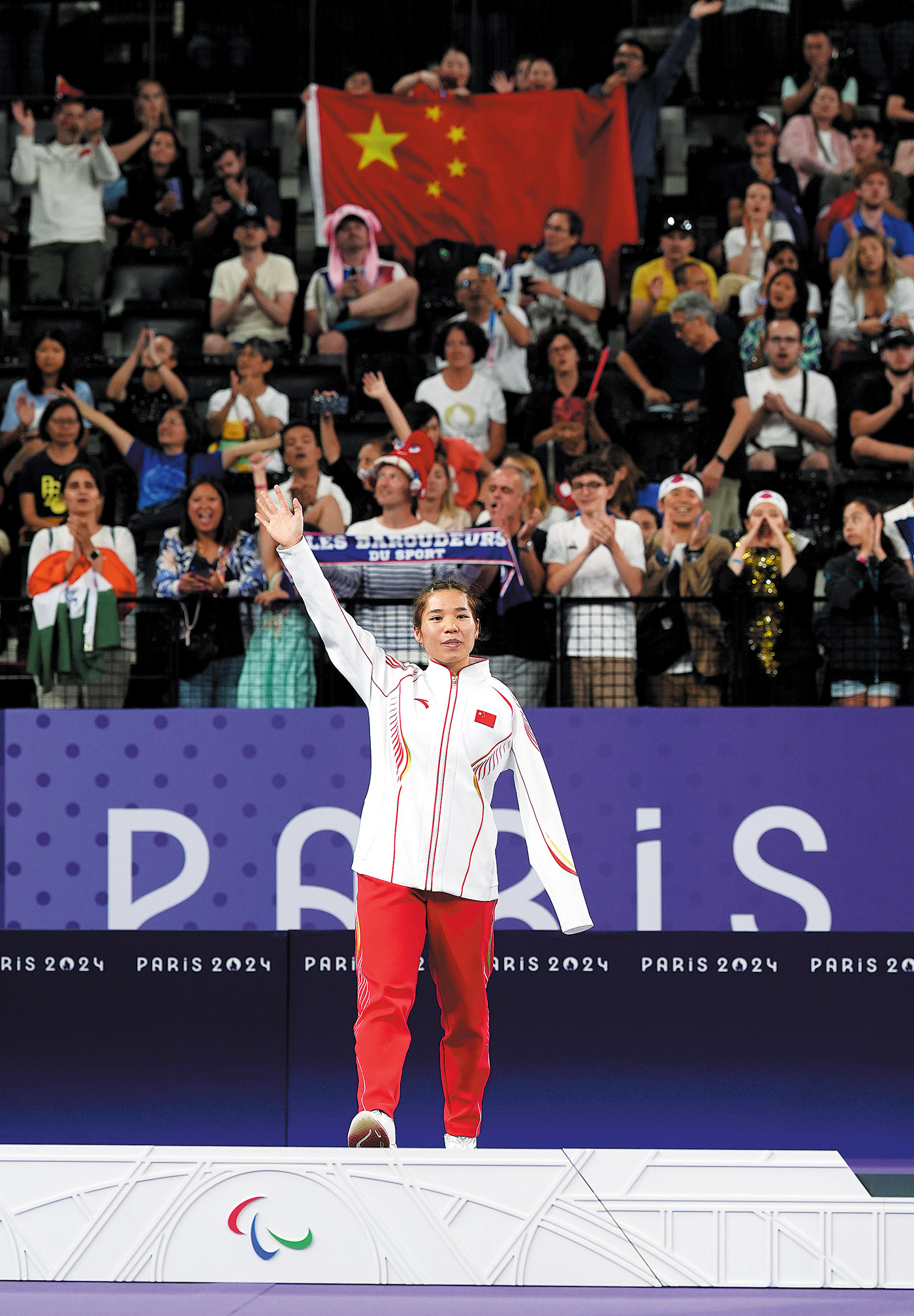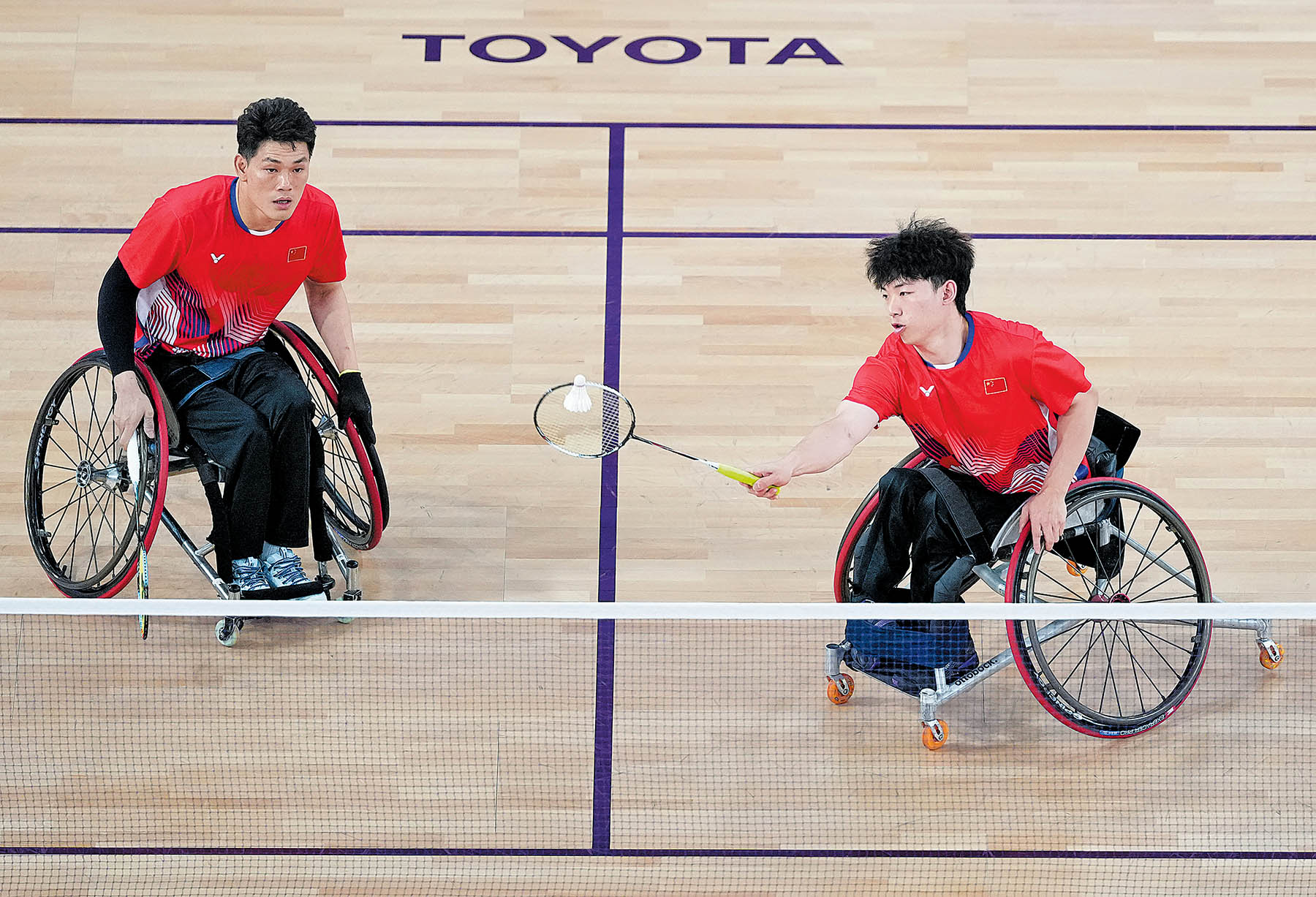China’s para badminton success propelled by perseverance of coaches, athletes

Badminton is a relative newcomer to the Paralympic stage, debuting just three years ago at the Tokyo Games. At this year’s Paris Paralympics, the sport expanded to 16 events. Yet, China’s para badminton team has long been prepared for the challenge.
At just 15, Yang Qiuxia declared her ambition to top the Olympic podium and see China’s flag raised high.
Now 26, she delivered on that promise in both Tokyo and Paris.
Meanwhile, Qu Zimo has spent a decade honing his badminton skills and collected four gold medals over two Paralympics. At just 22, he remains at the height of his career.
In Paris, the Chinese team not only defended all five of its gold medals from Tokyo, it asserted its dominance in the discipline, winning nine golds, two silvers and a bronze across 14 events.
The athletes’ remarkable success is built on scientific training, the close, family-like care of their coaches, and years of collaboration that have fostered deep bonds throughout the team. Ultimately, it was not just strategy that secured their victories — it was teamwork and a shared sense of purpose.
Team head coach Dong Jiong said the group’s preparation for the Paris Games over the past three years involved intense effort. “Our players have surpassed their own limits in Paris, showcasing extraordinary strength and willpower. Every swing of the racket and every drop of sweat has fueled our team’s ongoing motivation,” he said.
Qu Zimo is the team’s lighthearted spirit, and despite his youth, he’s already the most decorated Paralympic gold medalist in China’s para badminton squad. At the Tokyo Paralympics, he secured gold in men’s singles WH1 and, alongside teammate Mai Jianpeng, clinched gold in men’s doubles WH1-WH2. In Paris, he successfully defended both titles.
“I’m not one to make bold statements, so I didn’t mention my goals in pre-event interviews,” Qu said. “But now I can proudly tell the world I was determined to win both golds again, a goal I set right after Tokyo.”

Qu attributes much of his development to his 35-year-old teammate Mai, who has been with him every step of the way.
A decade ago, when Qu joined the team with no prior experience in badminton, he shared a dorm with Mai.
“Mai was the best in the wheelchair category when I first joined, and I set him as my benchmark,” Qu recalls.
As Qu improved, the two became doubles partners. They frequently watched match replays together, analyzing both their own performances and those of their opponents, gradually building a seamless partnership.
“He’s taught me so much — not just about badminton, but about life,” Qu said. “Mai’s calm demeanor balances my impulsive nature. During matches, he’s always reminding me to stay grounded. Overexcitement can scatter your focus, and in competition, that’s something you can’t afford.”
Beyond the support from his teammates, Qu highlighted the immense dedication of the coaching staff throughout this Paralympic cycle, crediting their detailed preparation and tailored training plans for the team’s success.
“Our coaches handle multiple athletes, and while we might have just one match and can rest afterward, they’re working tirelessly from 8 am to 10 pm every day,” Qu said.
He praised the coaches as “all-round experts” — not only guiding athletes in training but addressing their personal challenges and helping them stay focused and emotionally balanced.
In Paris, Yang Qiuxia celebrated her successful defense of the women’s singles SU5 title by rushing into the arms of her coach, Zhang Xianming, with both shedding tears of joy and relief. The emotions behind the tears were complex — a blend of triumph and release after years of relentless effort.
Zhang reflected on their journey, noting that Yang had cried several times throughout their years together. Zhang said that from her Tokyo triumph to this Paris victory, Yang’s achievements have come at the cost of immense perseverance and sacrifice.
At 48, Zhang has devoted half her life to coaching para badminton, beginning her journey in 2001.
“My initial intention was to offer these children happiness through sports. To see them reach the highest podium through their own hard work is the greatest reward,” Zhang said.

In para sports, preventing secondary injuries and avoiding further disability are paramount.
Zhang explained that while the training regimen for the para badminton team mirrors that of professional teams, it is tailored to meet the specific needs of each classification and athlete. The focus is on meticulously managing exercise loads and maximizing the quality of training sessions.
Despite her long tenure, Zhang remains deeply moved by the athletes’ indomitable spirit. “Often, they only pause for rest under my ‘mandatory’ guidance,” she said.
Zhang revealed that her time with the athletes has significantly surpassed the time spent with her own family since entering the para sports arena. She views the athletes as her own children, and they, in turn, regard her and her coaching team as their closest confidants.
“We consider our badminton team a big family,” Zhang said with a smile. “The female coaches are like ‘moms’ and the male coaches are like ‘dads’.”
At the Tokyo Paralympics, China’s Liu Yutong and Yin Menglu fell to Japan’s Sarina Satomi and Yuma Yamazaki in the women’s doubles WH1-WH2 final.
However, at the Paris Paralympics, as the top-seeded duo, Liu and Yin faced their old rivals in the final again — and this time, they secured the victory and the gold medal.
Their coach, Qu Fuchun, leaped onto the court, pumping his fists and spinning his jubilant players around as they basked in the crowd’s cheers.
“Our players have made immense sacrifices over these years. Their hands are covered in blisters and calluses from constantly maneuvering their wheelchairs,” Qu Fuchun said.
“Once the match ended, all the emotions we had been holding back came pouring out.”
Qu Fuchun has spent more than a decade alongside his athletes, living and training with them. A former para badminton player, he retired in 2011 and transitioned to coaching, bringing invaluable firsthand experience.
“Wheelchair badminton started relatively late in China, and we didn’t have any established training methods to follow. We had to figure it all out on our own,” Qu Fuchun explained.
Drawing on his experience as a para athlete, Qu Fuchun pays special attention to injury prevention during training.
Qu leads them through a warm-up routine he personally developed to fully activate their bodies and stretch their fascia before each match, helping prevent injuries during training and in competition.
Watching his athletes grow from novices to Paralympic champions has given him a profound sense of fulfillment.
Now 62, Qu Fuchun hopes to continue nurturing new talent for China’s para badminton team, strengthening the squad’s development and building a pipeline for future champions.


